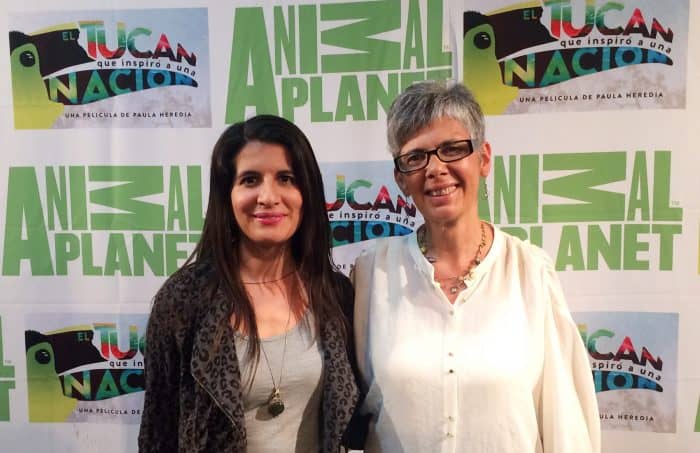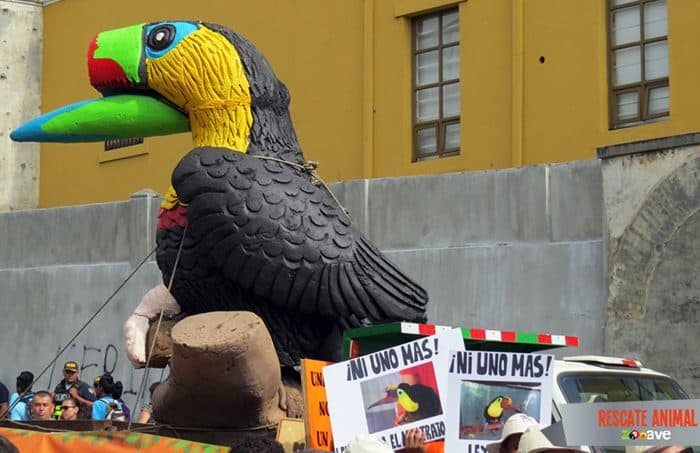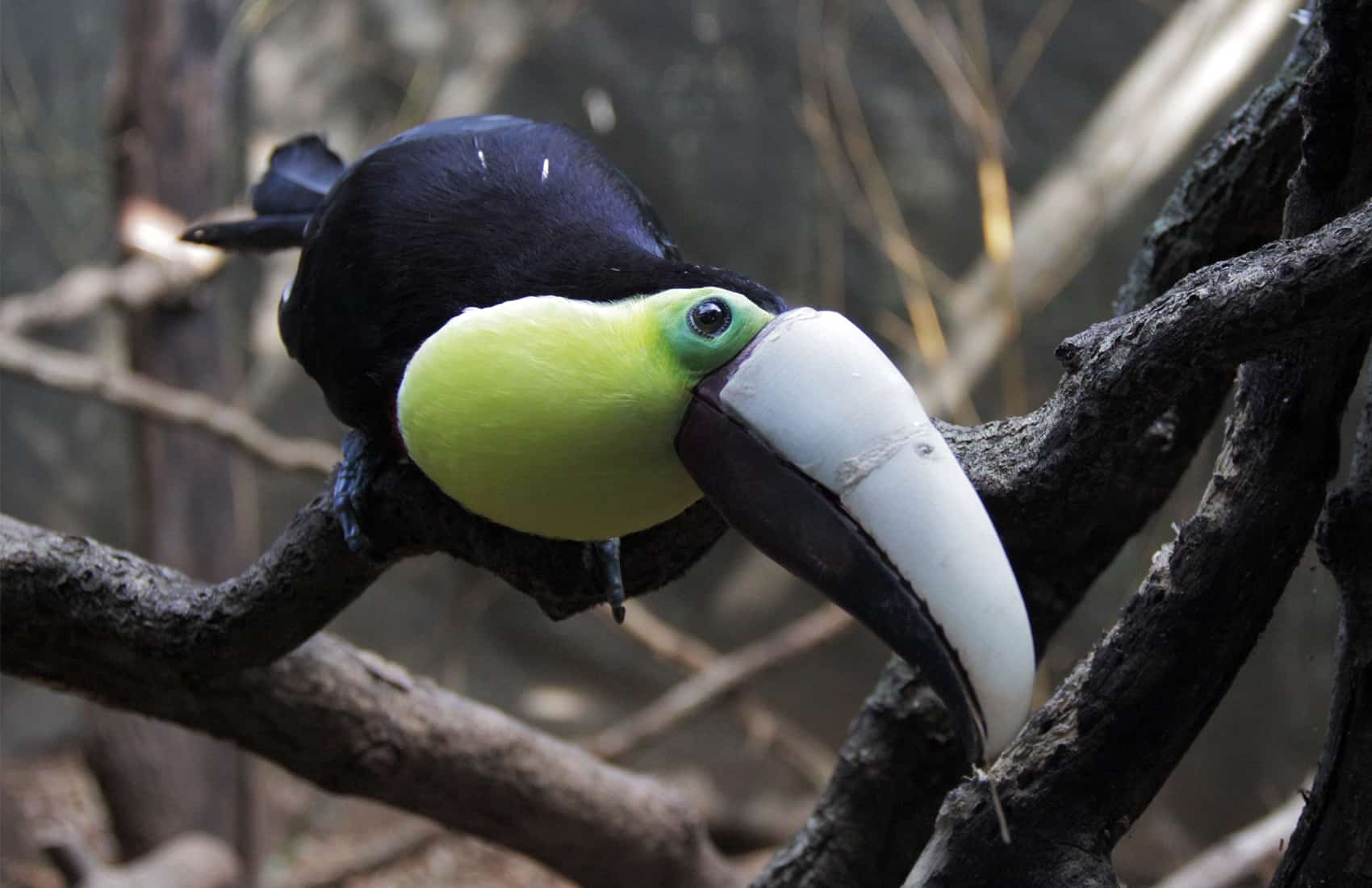Images of the disfigured Costa Rican toucan Grecia, which lost most of its upper beak in an apparent attack, appeared last year in hundreds of news outlets around the world. Now a Discovery Networks documentary called “Toucan Nation” tells its story and its impact on Costa Rica.
The 40-minute feature film directed by Tico-Salvadoran filmmaker Paula Heredia premiered Monday night at a special screening in San José. Discovery will air the documentary worldwide in August on Animal Planet.
With a very emotive narrative, the documentary alternates between the uplifting story of Grecia with the national movement it sparked demanding stronger legal protections for animals and harsher penalties for animal abuse.
The documentary describes the toucan’s life from the moment it settled on an avocado tree on a farm in the Alajuela canton of Grecia to the life-saving surgery that gave it a 3D-printed prosthetic beak.
Farm workers thought the bird, which they first named “Panchito,” likely escaped from captivity on a nearby property since it seemed to be accustomed to humans. Its tameness might have made the bird an easy target for its attackers, one of the farmers speculated in the film.
One day in January 2015, those same farmers found the bird covered in blood with a gruesomely wounded beak and reported it to the Environment Ministry. Officials took the bird to ZooAve, an animal refuge that became Grecia’s permanent home. Its caregivers there named the toucan after the town where it was found.
The film follows Grecia’s recovery at the refuge along with the outrage sparked in Costa Rica and many other countries by the bird’s story. It also follows the evolution of the animal welfare bill, currently stalled at the Legislative Assembly, which would impose harsher sanctions including prison time for hurting or killing animals.
Grecia’s recovery process is mostly narrated by ZooAve’s veterinarians and caregivers, who highlight the toucan’s unbreakable will to survive and heal. The toucan’s will drove ZooAve staff to launch an international crowdfunding campaign to get Grecia a prosthetic beak to allow it to feed itself and live as normal a life as possible.
The film includes an interview with Charles W. Hull, known as the father of 3D printing, who joined local efforts to achieve the best design and construction for Grecia’s prosthetic beak. Hull’s California-based company 3D Systems provided the 3D printing of the beak, which was jointly designed by a group of Costa Rican industrial designers, dentists, engineers, ornithologists and other professionals.
The documentary’s final scenes show the prosthetic beak being assembled and the toucan’s positive reactions to it. The audience at the premier Monday gave the film a standing ovation.
Despite the improvement in the bird’s quality of life, Grecia will remain at the zoo, as experts believe it would not be able to survive in the wild.
But the toucan now has a new, bigger cage which the public can visit likely in August, following the international premiere of the documentary. The new cage is 7 meters high, 10 meters wide and 9 meters deep, ZooAve reported.

Producing ‘Toucan Nation’
Heredia is an award-winning filmmaker based in New York. She received an Emmy for the HBO documentary “In Memoriam, NYC 9/11/01” and an ACE Eddie Award for the documentary “Unzipped,” among other accolades.
Heredia told The Tico Times that she first heard about Grecia on a radio news report. She immediately called her friends in Costa Rica to find out more about the toucan. Her next call was to Discovery Channel’s executive producer John Hoffman, who also had just heard the radio report. “We immediately agreed that Grecia’s story was something worth telling,” she said.
Heredia said that, for her, Grecia is an icon. The bird’s story brought together disparate groups to agreed that something had to be done against animal abuse in Costa Rica.
“It was evident for us that Grecia’s story was powerful, it attracted the interest of different sectors, from animal activists and scientists to the executive branch and the Legislative Assembly,” she said.
“Grecia is now a symbol,” Heredia noted, adding that there are many “Grecias” of many other species that have suffered abuse. She said for the production group it made perfect sense to tell the bird’s story so that it could become the voice for many other abused animals.
Production of “Toucan Nation,” known in Spanish as “El Tucán que Inspiró a una Nación,” took a year and a half, including nearly seven months of filming in Costa Rica and in the U.S.
“It was a highly demanding project, but no effort can compare to the one Grecia made to survive,” Heredia said.
“Toucan Nation” officially premiered in June at the Sheffield Documentary Festival in England and in the U.S. at the American Film Institute’s documentary film festival.
Heredia said the reception at both festivals was great, mainly because the audience empathized with the animal rights issues.
The film has also had a limited release in some theaters in Los Angeles. Heredia said she will keep presenting her documentary in other festivals following its TV release.
Animal Planet will air “Toucan Nation” in 170 countries starting August 2, while Animal Planet Latin America will broadcast it for Mexico and Central America on August 3 at 8 p.m. (Costa Rica time), the channel reported.

Animal welfare bill still pending
National Liberation Party lawmaker Ronny Monge attended the Costa Rica premiere and added to the evening spirit by confirming that legislators agreed Monday to remove more than 70 motions filed against the animal welfare bill, hopefully easing the stalemate over its approval.
The agreement means the bill could be discussed and voted on in a first round as soon as next Tuesday. To become law, the bill needs to pass two separate rounds of voting.
Monge said Libertarian Movement lawmaker Otto Guevara, who filed most of the motions against the bill, and Social Christian Unity Party lawmaker Johnny Leiva agreed to remove all of their objections under the condition that the bill be sent to the Constitutional Chamber of the Supreme Court, or Sala IV, to asses whether it is constitutional.
Lawmakers also agreed to amend the bill to eliminate the possibility that killing animals for consumption could be deemed cruel under the law, Monge said. If there are no further delays, the bill could be passed by the legislature by the end of August, he added.
Watch a video of Grecia produced last year by The Tico Times:






